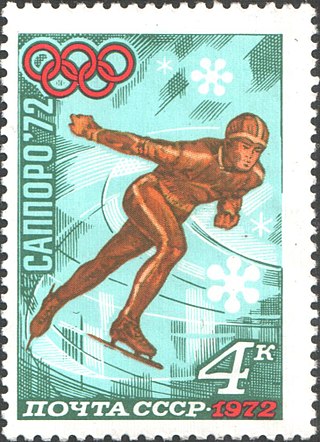
The Winter Olympic Games, also known as the Winter Olympics, is a major international multi-sport event held once every four years for sports practiced on snow and ice. The first Winter Olympic Games, the 1924 Winter Olympics, were held in Chamonix, France. The modern Olympic Games were inspired by the ancient Olympic Games, which were held in Olympia, Greece, from 776 BCE to 394 CE. The Baron Pierre de Coubertin of France founded the International Olympic Committee (IOC) 1,500 years later in 1894, leading to the first modern Summer Olympic Games in Athens, Greece in 1896. The IOC is the governing body of the Olympic Movement, with the Olympic Charter defining its structure and authority. The original five Winter Olympic Sports were bobsleigh, curling, ice hockey, Nordic skiing, and skating. The Games were held every four years from 1924 to 1936, interrupted in 1940 and 1944 by World War II, and resumed in 1948. Until 1992, the Summer Olympic Games and the Winter Olympic Games were held in the same year. A decision to change this was made in 1986, when during the 91st International Olympic Committee session, IOC members decided to alternate the Summer Olympic Games and the Winter Olympic Games on separate four-year cycles in even-numbered years. Also, at that same congress it was decided that 1992 Winter Olympics would be the last to be held in the same year as the Summer Games and that to change the rotation, the games that would be held in 1996 would be brought forward by two years, being scheduled to 1994. After those games, the next were to be held in 1998 when the four-year Olympic Cycle resumed.

The 1964 Winter Olympics, officially known as the IX Olympic Winter Games and commonly known as Innsbruck 1964, were a winter multi-sport event which was celebrated in Innsbruck, Austria, from January 29 to February 9, 1964. The city was already an Olympic candidate, unsuccessfully bidding to host the 1960 Games. Innsbruck won the 1964 Games bid, defeating the cities of Calgary in Canada and Lahti in Finland. The sports venues, many of which were built for the Games, were located within a radius of 20 km (12 mi) around Innsbruck. The Games included 1,091 athletes from 36 nations, which was a record for the Winter Games at the time. Athletes participated in six sports and ten disciplines which bring together a total of thirty-four official events, seven more than the 1960 Winter Olympic Games. The luge made its debut on the Olympic program. Three Asian nations made their Winter Games debut: North Korea, India and Mongolia.

The 1976 Winter Olympics, officially known as the XII Olympic Winter Games, was a winter multi-sport event held in Innsbruck, Austria, from 4 to 15 February 1976. A total of 1,123 athletes representing 37 National Olympic Committees (NOC) participated in 37 events from 10 different sports and disciplines. Two events were contested for the first time: the figure skating discipline of ice dancing, and the men's 1,000 metres in speed skating.
The 1964 Winter Olympics, officially known as the IX Olympic Winter Games, was a multi-sport event held in Innsbruck, Austria, from 29 January to 9 February. A total of 1,091 athletes from 36 nations participated in 34 events in 6 sports over 10 disciplines. India, Mongolia, and North Korea made their first Winter Olympics appearances; the latter achieved a 3,000 metres speed skating medal through Han Pil-hwa's silver medal tie with Valentina Stenina.

Lidiya Pavlovna Skoblikova is a retired Russian speed skater and coach. She represented the USSR Olympic team during the Olympic Winter Games in 1960, 1964 and 1968, and won a total of six gold medals, a record she shares with Dutch speed skater Ireen Wüst. She also won 25 gold medals at the world championships and 15 gold medals at the USSR National Championships in several distances. She was also the first athlete to earn six gold medals in the Winter Olympics and the first to earn four gold medals at a single Olympic Winter Games. She was the most successful athlete at the 1960 and 1964 Winter Olympics, sharing the honour for 1960 Games with her compatriot Yevgeny Grishin.

Long-track speed skating, usually simply referred to as speed skating, is the Olympic discipline of speed skating where competitors are timed while crossing a set distance. It is also a sport for leisure. Sports such as ice skating marathon, short-track speedskating, inline speedskating, and quad speed skating are also called speed skating.

Speed skating at the 1998 Winter Olympics, was held from 8 to 20 February. Ten events were contested at M-Wave. The Netherlands dominated the Nagano speed skating events, winning five gold medals and eleven medals overall, their highest total in any Winter games up until that point. Bart Veldkamp's bronze medal was the first in speed skating for Belgium, and the first at the Winter Games for the country in 50 years. Lyudmila Prokasheva's bronze medal for Kazakhstan was that country's first in the sport as well, and Prokasheva became the first woman from Kazakhstan to earn an Olympic medal.
Speed skating at the 1992 Winter Olympics, was held from 9 to 20 February. Ten events were contested at L'anneau de vitesse. It was the last time in Winter Olympics in which speed skating events were contested in an outdoor ice rink.
Speed skating at the 1976 Winter Olympics, was held from 5 to 14 February. Nine events were contested at Eisschnelllaufbahn Innsbruck. This was the first Olympics which included the men's 1000 metres, and the first change to the men's program at the Olympics since the elimination of the all-round event in 1928.
Speed skating at the 1980 Winter Olympics, was held from 9 February to 18 February. Nine events were contested at James B. Sheffield Olympic Skating Rink.
Speed skating at the 1984 Winter Olympics was held from 9 to 18 February. Nine events were contested at Zetra Ice Rink.

Speed skating at the 1972 Winter Olympics, was held from 4 to 12 February. Eight events were contested at Makomanai Open Stadium in Sapporo, Japan. This was the first Olympics at which electronic times were recorded to the hundredth of a second.
Speed skating at the 1968 Winter Olympics, was held from 4 to 12 February. Eight events were contested at L'Anneau de Vitesse in Grenoble, France.

Speed skating at the 1994 Winter Olympics, was held from 13 to 25 February. Ten events were contested at Hamar Olympic Hall.
Speed skating at the 1988 Winter Olympics was held from 14 to 28 February. Ten events were contested at Olympic Oval. For the first time, the women contested a 5000-metre race, the longest distance contested by women in speed skating.

Tatyana Borisovna Averina was a Soviet Russian speed skater. After getting married, her name also appeared as Tatyana Barabash.

Figure skating at the 2010 Winter Olympics was held at the Pacific Coliseum in Vancouver, British Columbia, Canada. The events took place between 14 and 27 February 2010.

Lin Xiaojun, born Lim Hyo-jun, is a South Korean-born Chinese short track speed skater. He is the 2018 champion of the Men's 1500 m event in short track speed skating at the Winter Olympics, and also set the new Olympic record for the event. Originally starting as a swimmer, Lim took up skating at a young age. Despite multiple injuries early on in his career, he notably won gold at the 2012 Winter Youth Olympics upon his international debut in the Boys' 1000 m event. He would later win the 1000 m and 1500 m events in the Budapest leg of the 2017–18 ISU Short Track Speed Skating World Cup and earn selection for the 2018 Winter Olympics in Pyeongchang. Upon his Olympic debut, Lim won the gold medal, setting a new Olympic record of 2:10.485 in the process, beating Lee Jung-su's previous record set at the 2010 games.












